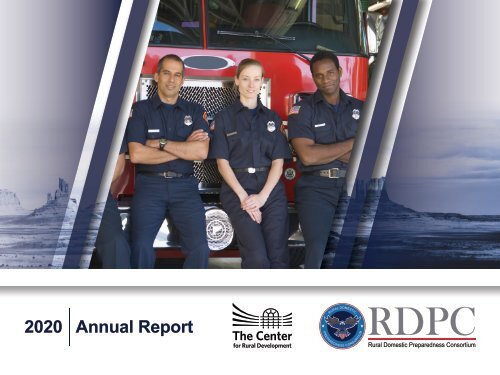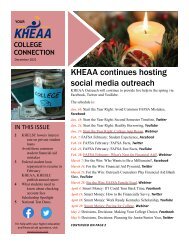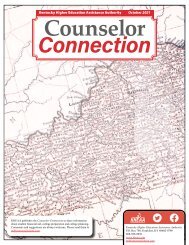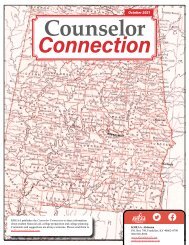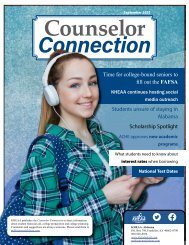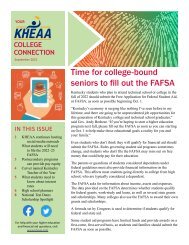2020 RDPC Annual Report
2020 RDPC Annual Report. The Rural Domestic Preparedness Consortium (RDPC), led by The Center for Rural Development, is comprised of academic members with the expertise in developing and delivering homeland security curriculum for rural and tribal first responders. For more information, visit us at www.ruraltraining.org
2020 RDPC Annual Report.
The Rural Domestic Preparedness Consortium (RDPC), led by The Center for Rural Development, is
comprised of academic members with the expertise in developing and delivering homeland security
curriculum for rural and tribal first responders. For more information, visit us at www.ruraltraining.org
Create successful ePaper yourself
Turn your PDF publications into a flip-book with our unique Google optimized e-Paper software.
RURAL DOMESTIC<br />
PREPAREDNESS CONSORTIUM
The Rural Domestic Preparedness Consortium (<strong>RDPC</strong>),<br />
through its Consortium Members, will provide small, rural,<br />
and tribal responders and communities with the knowledge,<br />
skills, and abilities to enhance the safety, and quality of life<br />
for their citizens through training, technical assistance, and<br />
information sharing.<br />
Rural communities across America will have the knowledge,<br />
skills, and abilities necessary to enhance the safety, security,<br />
and quality of life for citizens.<br />
RURAL DOMESTIC<br />
PREPAREDNESS CONSORTIUM<br />
1 | Rural Domestic Preparedness Consortium
Executive Message<br />
Meet the Consortium Members<br />
Meet the <strong>RDPC</strong> Staff Members<br />
The Center for Rural Development<br />
What is Rural?<br />
Training Disciplines Reached<br />
<strong>2020</strong> Training Numbers<br />
3<br />
4<br />
5-6<br />
7-8<br />
9<br />
10<br />
11-12<br />
Training Innovation Overcomes Obstacles<br />
National Training Map<br />
Training Kentucky and the Nation (magazine article)<br />
Academic Members and Affiliates<br />
Tribal Nations Preparedness Training<br />
A Message from the Director<br />
13-15<br />
16<br />
17-20<br />
21-32<br />
33<br />
34<br />
The Rural Domestic Preparedness Consortium (<strong>RDPC</strong>), led by The Center for Rural Development, is<br />
comprised of academic members with the expertise in developing and delivering homeland security<br />
curriculum for rural and tribal first responders. For more information, visit us at www.ruraltraining.org<br />
This project was supported by Cooperative Agreement Numbers EMW-2016-CA-00097-S01, EMW-2017-CA-00052-S01,<br />
EMW-2018-CA-00075-S01, and EMW-2019-CA-00048-S01 and administered by the U.S. Department of Homeland Security. Points of view or<br />
opinions expressed in this document are those of the author and do not represent the official position or policies of U.S. Department of Homeland<br />
Security.<br />
FEMA’s National Training and Education Division (NTED) offers a full catalog of courses at no-cost to help build critical skills that responders need<br />
to function effectively in mass consequence events. Course subjects range from Weapons of Mass Destruction (WMD) terrorism, cybersecurity,<br />
and agro-terrorism to citizen preparedness and public works. NTED courses include multiple delivery methods: instructor-led (direct deliveries),<br />
virtual deliveries (instructor-led), train-the-trainers (indirect deliveries), customized (conferences and seminars) and web-based. Instructor-led<br />
courses are offered in residence (i.e. at a training facility) or through mobile programs, in which courses are brought to state and local jurisdictions<br />
that request the training. A full list of NTED courses can be found at www.firstrespondertraining.gov.<br />
<strong>2020</strong> <strong>Annual</strong> <strong>Report</strong> | 2
Executive Message<br />
The COVID-19 global pandemic of <strong>2020</strong> has yielded unprecedented<br />
challenges within the emergency responder training community. As the<br />
virus spread rapidly, delivering an in-person preparedness curriculum was<br />
no longer an option to ensure our nation’s emergency responders stayed<br />
safe and healthy. In the face of adversity, the <strong>RDPC</strong> overcame these<br />
obstacles by delivering practical, innovative training solutions to<br />
emergency responders in small, rural, and tribal jurisdictions.<br />
Led by The Center for Rural Development in Somerset, KY, the <strong>RDPC</strong> has<br />
trained more than 110,000 emergency responders from small, rural, and<br />
tribal communities in all 50 states and 5 U.S. territories from January 2005<br />
through December <strong>2020</strong>.<br />
No matter the circumstances, the <strong>RDPC</strong> remains dedicated to the mission<br />
of delivering all-hazards training by helping our nation’s first responders...<br />
Lonnie Lawson<br />
<strong>RDPC</strong> Principal Investigator<br />
President & CEO<br />
The Center for Rural Development<br />
3 | Rural Domestic Preparedness Consortium<br />
RURAL DOMESTIC<br />
PREPAREDNESS CONSORTIUM<br />
The <strong>RDPC</strong> works in close partnership with<br />
the National Domestic Preparedness<br />
Consortium (NDPC) to secure and prepare<br />
a safe and resilient nation. The Consortium<br />
consists of seven-member organizations,<br />
each having distinguished themselves<br />
nationally as experts in their field.
The Consortium Members<br />
Led by The Center for Rural Development, the <strong>RDPC</strong> is comprised of 5<br />
academic members and 1 affiliate with expertise and niche capabilities in<br />
developing and delivering training to small, rural, and tribal communities.<br />
Each institution brings a vast amount of knowledge and experience that<br />
prepares communities in the event of a disaster. We value each member,<br />
as well as their steadfast dedication to help others “prepare for the worst<br />
and train to be the best.”<br />
For more information about the <strong>RDPC</strong> and it’s academic members, visit us<br />
online at www.ruraltraining.org or call 877-855-<strong>RDPC</strong> (7372).<br />
<strong>2020</strong> <strong>Annual</strong> <strong>Report</strong> | 4
The <strong>RDPC</strong> Staff<br />
Lonnie Lawson<br />
Principal Investigator<br />
llawson@centertech.com<br />
Jennifer Grigsby<br />
Director of Program Development,<br />
Evaluation, and Design<br />
jgrigsby@centertech.com<br />
Julie Wilson<br />
Director<br />
jwilson@centertech.com<br />
Kim Ellis<br />
Program Administrator<br />
kellis@centertech.com<br />
Danny Ball<br />
Associate Director<br />
dball@centertech.com<br />
Michael Crowhurst<br />
Delivery Coordinator<br />
mcrowhurst@centertech.com<br />
5 | Rural Domestic Preparedness Consortium
Vicki Hiestand<br />
Associate Director of Finance<br />
vhiestand@centertech.com<br />
Laura Glover<br />
Managing Director of<br />
Marketing & Events<br />
lglover@centertech.com<br />
RURAL DOMESTIC<br />
PREPAREDNESS CONSORTIUM<br />
Crystal Tygart<br />
Staff Accountant<br />
ctygart@centertech.com<br />
Ray Hagen<br />
Marketing Associate <strong>RDPC</strong><br />
rhagen@centertech.com<br />
Much like the rural first responder community, our staff,<br />
support team, and consortium members work together to<br />
achieve the overall mission and vision of the <strong>RDPC</strong>. The<br />
team is honored to serve our nation’s first responders by<br />
delivering relevant, all hazards training to small, rural and<br />
tribal communities across America.<br />
RURAL DOMESTIC<br />
PREPAREDNESS CONSORTIUM<br />
<strong>2020</strong> <strong>Annual</strong> <strong>Report</strong> | 6
The Center for Rural Development<br />
<strong>RDPC</strong> is led by The Center for Rural Development in Somerset, KY. Established in 1996 through the<br />
vision of U.S. Congressman Harold Rogers (KY-05), The Center for Rural Development is a 501c(3)<br />
nonprofit organization fueled by a mission to provide leadership that stimulates innovative and<br />
sustainable economic development solutions and a better way of life for the citizens we serve. The<br />
Center is also a nationally recognized model for successful rural development.<br />
The Center has four Focus Areas: PUBLIC SAFETY, ARTS & CULTURE, LEADERSHIP, and<br />
TECHNOLOGY, serving a 45-county primary service area in Southern and Eastern Kentucky. We are<br />
committed to constantly expanding our capabilities in order to deliver a range of key services throughout<br />
Kentucky and beyond. The Center’s Public Safety programs are reaching first responders and law<br />
enforcement professionals across the nation.<br />
The Center has expertise in developing and administering training programs, including curriculum<br />
design, development, and delivery, utilizing the in-house web and video conference systems required to<br />
reach the rural homeland security community. As Executive Agent, The Center also plays a key role as a<br />
technology provider to the <strong>RDPC</strong> program. The Center is responsible for the design, development, and<br />
continued support of the <strong>RDPC</strong> web presence as well as online training registration, evaluation reporting<br />
capabilities, and learning management systems. The Center is a DHS/FEMA training provider.<br />
7 | Rural Domestic Preparedness Consortium
The Center for Rural Development 2292 S. Hwy. 27. Somerset, KY 42501 centertech.com (606) 677-6000<br />
<strong>2020</strong> <strong>Annual</strong> <strong>Report</strong> | 8
What is Rural?<br />
Since its inception, <strong>RDPC</strong> has worked diligently to develop and deliver training to small and rural communities throughout<br />
the United States. While Americans tend to have an idealized image of rural America, a common definition for “rural” is<br />
difficult to find and is one of the most popular questions asked of <strong>RDPC</strong>.<br />
Consistent with guidance from the U.S. Census Bureau, <strong>RDPC</strong> defines the rural communities it serves as “any location<br />
with a population of less than 50,000 and with a population density of less than 1,000 persons per square mile.”<br />
In addition to the U.S. Census Bureau, most Federal agencies use a population threshold of under 50,000 to define a<br />
“rural” area.<br />
<strong>RDPC</strong> interprets the phrase, “any location,” as applying to cities, towns, villages, parishes, communities, and counties, a<br />
flexibility that ensures areas are not excluded unduly. For example, this definition can include a rural city within an urban<br />
county. The citizens of rural communities face unique challenges when preparing for all-hazards. For example, limited<br />
population and tax bases can create difficulties for community public safety agencies in terms of staffing, equipment, and<br />
other resources.<br />
In many cases, <strong>RDPC</strong> represents the only opportunity for emergency response service providers to obtain access to<br />
timely, effective training. Therefore, understanding rural America and working to identify its specific needs are critical<br />
tasks for <strong>RDPC</strong>.<br />
By speaking with rural responders and researching rural needs and capability gaps, <strong>RDPC</strong> recognizes that many rural<br />
response agencies are staffed by volunteers, and backfill for training remains an issue. Yet, rural responders represent<br />
the surge capacity and increased capabilities the U.S. relies on to assist in large scale disasters.<br />
A rural area is often the first line of defense to immediately contain an event or disaster before it escalates. It is imperative<br />
that rural responders receive the training and tools necessary to help keep the Nation safe and prepared.<br />
9 | Rural Domestic Preparedness Consortium
Training Disciplines Reached in <strong>2020</strong><br />
Level of Discipline<br />
Students Trained<br />
Agricultural Safety<br />
19<br />
Animal Emergency Services<br />
21<br />
Citizen / Community Volunteer<br />
49<br />
Emergency Management<br />
471<br />
Emergency Medical Services<br />
48<br />
Fire Service<br />
209<br />
Governmental Administrative<br />
38<br />
Hazardous Materials<br />
2<br />
Healthcare<br />
66<br />
Information Technology<br />
5<br />
Law Enforcement<br />
363<br />
Private Sector<br />
0<br />
Public Health<br />
146<br />
Public Safety Communications<br />
22<br />
Public Works<br />
13<br />
Security and Safety<br />
18<br />
Search and Rescue<br />
13<br />
Transportation Security<br />
9<br />
Other<br />
532<br />
Total Number of Students Trained 2,044<br />
(Data reflects training disciplines reached for ILT and virtual course deliveries. Data does not reflect web-based training.)<br />
<strong>2020</strong> <strong>Annual</strong> <strong>Report</strong> | 10
Instructor-Led Courses<br />
AWR 144 Port and Vessel Security for Public Safety and Maritime Personnel<br />
AWR 147 Rail Car Incident Response<br />
AWR 148 Crisis Management for School-Based Incidents: Partnering Rural Law Enforcement,<br />
First Responders, and Local School Systems<br />
AWR 209 Working with the Media: A Course for Rural First Responders<br />
AWR 232 Mass Fatalities Planning and Response for Rural Communities<br />
AWR 302 Pipeline Security for Rural Communities<br />
AWR 328 All Hazards Preparedness for Animals in Disasters<br />
MGT 335 Event Security Planning for Public Safety Officials<br />
MGT 381 Business Continuity Planning<br />
MGT 383 Emergency Operations Plans for Rural Jurisdictions<br />
MGT 401 Planning and Intervention for Security Threat Groups, Hate, and Terrorist Groups<br />
in Rural Jails and Prisons<br />
MGT 403 Access and Functional Needs Preparedness Planning for Rural Communities<br />
MGT 405 Mobilizing Faith-Based Community Organizations in Preparing for Disasters<br />
MGT 406 Community Threat Group Identification, Assessment & Information <strong>Report</strong>ing<br />
for Rural Law Enforcement Officers<br />
MGT 415 Disaster Recovery in Rural Communities<br />
MGT 416 Continuity of Government Operations Planning for Rural Communities<br />
MGT 417 Crisis Management for School-Based Incidents for Key Decision Makers<br />
MGT 433 Isolation and Quarantine for Rural Communities<br />
MGT 448 All Hazards Planning for Animal, Agricultural, and Food Related Disasters<br />
MGT 449 Community-Based Response to All Hazards Threats in Tribal Communities<br />
PER 294 Testing an Emergency Operations Plan in a Rural EOC<br />
PER 333 Isolation and Quarantine Response Strategies in the Event of a Biological<br />
Outbreak in Tribal Communities<br />
Completions<br />
0<br />
133<br />
276<br />
121<br />
64<br />
0<br />
94<br />
78<br />
15<br />
14<br />
32<br />
137<br />
70<br />
0<br />
41<br />
19<br />
30<br />
81<br />
56<br />
19<br />
44<br />
0<br />
Total Instructor-Led Course Completions in <strong>2020</strong><br />
1,324<br />
11 | Rural Domestic Preparedness Consortium
Virtual Courses<br />
AWR 144-V Port and Vessel Security for Public Safety and Maritime Personnel<br />
AWR 147-V Rail Car Incident Response<br />
AWR 148-V Crisis Management for School-Based Incidents: Partnering Rural Law<br />
Enforcement, First Responders, and Local School Systems<br />
AWR 209-V Working with the Media: A Course for Rural First Responders<br />
AWR 232-V Mass Fatalities Planning & Response for Rural Communities<br />
MGT 381-V Business Continuity Planning<br />
MGT 383-V Emergency Operations Plans for Rural Jurisdictions<br />
MGT 401-V Planning and Intervention for Security Threat Groups, Hate, and Terrorist<br />
Groups in Rural Jails and Prisons<br />
MGT 403-V Access and Functional Needs Preparedness Planning for Rural Communities<br />
MGT 405-V Mobilizing Faith-Based Community Organizations in Preparing for Disasters<br />
MGT 406-V Community Threat Group Identification, Assessment & Information <strong>Report</strong>ing<br />
for Rural Law Enforcement Officers<br />
MGT 415-V Disaster Recovery in Rural Communities<br />
MGT 416-V Continuity of Government Operations Planning for Rural Communities<br />
MGT 433-V Isolation & Quarantine for Rural Communities<br />
Total Virtual Course Completions in <strong>2020</strong><br />
Web-Based Courses<br />
AWR 148-W Crisis Management for School-Based Incidents: Partnering Rural Law<br />
Enforcement, First Responders, and Local School Systems<br />
AWR 187-W Terrorism and WMD Awareness in the Workplace<br />
AWR 209-W Working with the Media: A Course for Rural First Responders<br />
MGT 335-W Event Security Planning for Public Safety Officials<br />
MGT 433-W Isolation and Quarantine for Rural Communities<br />
Total Web-Based Course Completions in <strong>2020</strong><br />
Completions<br />
203<br />
0<br />
148<br />
39<br />
138<br />
72<br />
25<br />
0<br />
0<br />
64<br />
0<br />
0<br />
0<br />
20<br />
11<br />
720<br />
135<br />
1255<br />
165<br />
196<br />
402<br />
2,153<br />
<strong>2020</strong> <strong>Annual</strong> <strong>Report</strong> | 12<br />
Total number of students trained in <strong>2020</strong>: 4,197
Training Innovation Overcomes Obstacles<br />
<strong>RDPC</strong> delivers virtual training solutions amidst the Coronavirus crisis.<br />
The global pandemic of <strong>2020</strong> has posed numerous challenges to the emergency responder training community. As the<br />
Coronavirus crisis progresses, the need for all- hazards preparedness continues. Instructor-led training opportunities have<br />
diminished due to the inherent challenges associated with social distancing. To overcome these obstacles, the Rural<br />
Domestic Preparedness Consortium (<strong>RDPC</strong>) has developed and implemented innovative, virtual, instructor-led training<br />
solutions for small, rural, and tribal jurisdictions utilizing the Zoom for Government training platform.<br />
Training here, there, and anywhere.<br />
This leading-edge technology offers a secure, sophisticated, encrypted environment so that emergency responders can<br />
"learn virtually anywhere." Each virtual delivery is an 8-hour course presented over two consecutive days. Each day<br />
consists of one 4-hour training session in which participants engage with a live instructor.<br />
These virtual deliveries cover a variety of relevant all-hazards training topics to include the following:<br />
AWR 144-V Port and Vessel Security for Public Safety and Maritime Personnel<br />
AWR 147-V Rail Car Incident Response<br />
AWR 148-V Crisis Management for School-Based Incidents: Partnering Rural Law Enforcement,<br />
First Responders, and Local School Systems<br />
AWR 209-V Working with the Media: A Course for Rural First Responders<br />
AWR 232-V Mass Fatalities Planning & Response for Rural Communities<br />
MGT 381-V Business Continuity Planning<br />
MGT 383-V Emergency Operations Plans for Rural Jurisdictions<br />
MGT 401-V Planning and Intervention for Security Threat Groups, Hate, and Terrorist Groups in Rural Jails and Prisons<br />
MGT 403-V Access and Functional Needs Preparedness Planning for Rural Communities<br />
MGT 405-V Mobilizing Faith-Based Community Organizations in Preparing for Disasters<br />
MGT 406-V Community Threat Group Identification, Assessment & Information <strong>Report</strong>ing for Rural Enforcement Officers<br />
MGT 415-V Disaster Recovery in Rural Communities<br />
13 | Rural Domestic Preparedness Consortium
MGT 416-V Continuity of Government Operations Planning for Rural Communities<br />
MGT 433-V Isolation & Quarantine for Rural Communities<br />
After months of planning and preparation, the <strong>RDPC</strong>—along with academic member University of Findlay's All Hazards<br />
Training Center—conducted the first two Zoom deliveries during the last week of July. They delivered AWR 148-V Crisis<br />
Management for School-Based Incidents-Partnering Rural Law Enforcement, First Responders, and Local School<br />
Systems course. A total of 51 students participated in and completed the deliveries that were held in the West Plains,<br />
Missouri and Bedford, Kentucky jurisdictions.<br />
Student engagement is key.<br />
Students in attendance represented diverse professional backgrounds including that of law enforcement, school system<br />
administrators, fire service professionals, and emergency medical service professionals. In the virtual training<br />
environment, students engaged with instructor Scott Lowry by asking and answering questions, participating in polls, and<br />
collaborating in group chat sessions. Scott's expertise as a law enforcement professional, accompanied by a passion to<br />
educate others, provided participants with invaluable insight into school-based incident preparedness.<br />
Interaction between the instructor and participants promoted valuable discussion regarding course content and past<br />
experiences. There were many comments on the evaluation form reflecting the benefit of virtual classroom interaction. For<br />
example, in response to the evaluation question regarding the part of the course that was most valuable, one participant<br />
commented: “Local interaction with other students, even virtually through chat.” Another participant added: “Module 3<br />
gave a lot of information and tools (about) threat assessments that I didn’t know about.”<br />
During the global pandemic, participant safety is paramount in delivering all-hazards training to emergency responders.<br />
"The benefits of virtual deliveries include no travel required and allowing folks to interact safely, with no concerns of<br />
COVID exposure," said Laura Hoehne, Project Manager for the All-Hazards Training Center at The University of Findlay.<br />
"Although we look forward to the time when we can resume face-to-face deliveries, we are excited (to offer) valuable<br />
RPDC training using the Zoom platform."<br />
Continuation of all-hazards training is paramount when ensuring our nation's emergency responders are adequately<br />
prepared. "We are dedicated to continuing training under the most difficult of circumstances," said Julie Wilson, Director of<br />
<strong>2020</strong> <strong>Annual</strong> <strong>Report</strong> | 14
the <strong>RDPC</strong>. When faced with the challenges of the global pandemic, the <strong>RDPC</strong> responded by providing innovative training<br />
solutions for our nation's emergency responder community.<br />
Feedback can be fun<br />
Countless hours of behind-the-scenes development and testing took place to ensure these virtual training deliveries would<br />
be successful. Everything had to be evaluated and examined, including course content, the registration process, and<br />
communication between the consortium and the participants. The process presented many new challenges but proved<br />
worthwhile and rewarding. There were lessons learned, as well as welcomed surprises during the virtual deliveries that<br />
will help guide future processes.<br />
Following the virtual deliveries, the <strong>RDPC</strong> received positive, encouraging participant feedback. One participant said "This<br />
is a GREAT ZOOM class. More classes need to be held like this. Just because the pandemic is around, doesn't mean<br />
people don't have time to train. We are sitting around, and wringing our hands thinking, we are behind on training. This is<br />
the PERFECT time to be doing more and more of this. Especially since folks can't travel and have had issues traveling for<br />
a couple of years. More classes need to be done by Zoom!"<br />
Another participant expressed gratitude to the consortium for offering unique training solutions during the pandemic. "This<br />
was my first virtual class and I really enjoyed it. It makes it easier to participate, not having to travel back and forth to<br />
physical locations. It is a busy time in the emergency management world, and this allows me to still be able to participate<br />
in classes without being removed from our EOC during an activation. I was worried about student-student interactions<br />
being lost but having the chat option actually made it easier to interact without disrupting the flow of the class. People are<br />
less reluctant to communicate through chat vs in person in front of a class. Great job!"<br />
Overall, these virtual deliveries proved overwhelmingly successful and enjoyable. The <strong>RDPC</strong> plans to implement and<br />
deliver more Zoom-based training opportunities to small, rural, and tribal jurisdictions across the U.S. in the future.<br />
Ray Hagen<br />
Marketing Associate<br />
The Center for Rural Developmment<br />
Article published in the TPP Times | <strong>2020</strong> Fall edition<br />
RURAL DOMESTIC<br />
PREPAREDNESS CONSORTIUM<br />
15 | Rural Domestic Preparedness Consortium
Over 110,000 students trained since 2006.<br />
RURAL DOMESTIC<br />
PREPAREDNESS CONSORTIUM<br />
2,924<br />
1,536<br />
549<br />
199<br />
959<br />
940<br />
4,714<br />
744<br />
1,344<br />
1,311<br />
738<br />
1,099<br />
1,203<br />
1,422<br />
1,560<br />
666<br />
3,145<br />
2,632<br />
2,987<br />
1,709<br />
6,224<br />
3,945 2,612<br />
932<br />
1,227 2,075 5,959<br />
2,795<br />
2,068<br />
1,006<br />
638<br />
3,831<br />
777<br />
293<br />
253<br />
4,871<br />
1,248<br />
1,197<br />
1,565<br />
5,744<br />
2,580<br />
1,929<br />
3,605<br />
3,235<br />
591<br />
4,888<br />
2,707<br />
2,223<br />
6,169<br />
443<br />
America Samoa------------<br />
Armed Forces Atlantic---<br />
Armed Forces Europe---<br />
Armed Forces Pacific----<br />
Guam--------------------------<br />
Military Police--------------<br />
Puerto Rico-----------------<br />
Virgin Islands--------------<br />
Washington D.C.-----------<br />
2<br />
3<br />
21<br />
11<br />
9<br />
5<br />
38<br />
43<br />
107<br />
Total: 110,250<br />
<strong>2020</strong> <strong>Annual</strong> <strong>Report</strong> | 16
Training Kentucky and The Nation<br />
Rural Domestic Preparedness Consortium equips responders with needed knowledge and skill.<br />
The following article was published in The Bridge | Kentucky’s Connection to Rural Health Issues. Fall edition, <strong>2020</strong>. Author: Katheran Wasson.<br />
Greg Gould traveled to a rural town in the Pacific Northwest around the first of the year to teach a course on<br />
isolation and quarantine to first responders — something that, at the time, was just another day on the job for the longtime<br />
instructor.<br />
A few weeks later, that course became incredibly relevant, as the first COVID-19 case in the United States was<br />
confirmed in Washington. It was an unfortunate but important reminder that, particularly when it comes to first responders,<br />
training has a real and significant impact.<br />
Gould is an instructor with the Rural Domestic Preparedness Consortium (<strong>RDPC</strong>), which has provided free training<br />
for rural first responders since 2005. Funded by the U.S. Department of Homeland Security, the consortium’s courses are<br />
offered to jurisdictions with populations of 50,000 or less as well as to tribal communities, with the overall goal of helping<br />
first responders in those communities — which often have limited budgets — to better respond to emergencies and<br />
disasters.<br />
The consortium serves first responders nationwide, but it has roots in Kentucky. The Center for Rural Development,<br />
based in Somerset, serves as the executive agent for the <strong>RDPC</strong>, and Eastern Kentucky University, in Richmond, is a<br />
member.<br />
The <strong>RDPC</strong> has trained more than 100,000 students in its history, including nearly 4,000 in Kentucky — no small<br />
feat for an organization focused on providing training to emergency responders working in the country’s small towns and<br />
communities. The consortium now trains more than 8,000 people a year in all 50 states and 5 U.S. territories.<br />
Attendees include those working in health care, emergency medical services and public health, but also areas<br />
beyond health, such as law enforcement, education, public works and other branches of government. The consortium<br />
takes a “whole community approach” to its training offerings and works to understand and meet the needs of rural<br />
America.<br />
“There is a misconception that emergency response is easier and simpler in rural areas, but that’s so far from<br />
reality,” said Gould, who specializes in teaching public health and safety courses when he’s not working as a first<br />
responder himself. “In rural areas, you have a limited number of providers and those providers have to be well-versed in<br />
17 | Rural Domestic Preparedness Consortium
so many different things.”<br />
Rural communities face unique challenges when it comes to emergency preparation and response. Limited public<br />
funding can create challenges in staffing, equipment and other resources. Plus, many rural first responders are volunteers<br />
or have other jobs.<br />
Gould likened it to “having brain surgery as a hobby.”<br />
“You have to have all the PPE (personal protective equipment), you have to understand it and be able to work<br />
these mechanisms — and then you still have to go to your regular job,” he said. “Responders in rural areas have to be<br />
jacks of all trades to keep their communities safe.”<br />
How it works<br />
Health-related training is just part of the <strong>RDPC</strong>’s range of course offerings. Other courses cover responding to<br />
mass fatalities, disaster recovery, port and vessel security, school safety, emergency operations and more. In all, there are<br />
23 instructor-led courses and five web-based courses.<br />
The consortium’s academic members — which include, in addition to EKU, North Carolina Central University in Durham;<br />
the University of Findlay in Findlay, Ohio; the University of California, Davis; Northwest Arkansas Community College in<br />
Bentonville, Arkansas; and, the University of Tennessee in Knoxville, an affiliate member — develop and deliver the<br />
training on behalf of <strong>RDPC</strong>.<br />
“It really is a collective of a number of people, a lot of people that they are in it for the right reason,” Gould said. “All<br />
of these people are just dedicated and passionate about what they do, and so it's just not another program on campus —<br />
this has real, dramatic and applicable impact to people’s safety around the U.S.”<br />
Each member brings its own niche to the table, according to <strong>RDPC</strong> Director Julie Wilson. For example, UC Davis<br />
has an agroterrorism food safety program, and the University of Tennessee has expertise in tribal training.<br />
But the COVID-19 pandemic brought in-person training to a screeching halt, Wilson said. The consortium quickly<br />
began adapting its courses to virtual delivery, with instructors teaching live via webcam to first responders who remained<br />
in their home communities. What were traditionally one-day, 8-hour courses held in a conference room are now broken up<br />
into two, four-hour sessions, with most participants joining from their home computers.<br />
Wilson said the consortium wanted to maintain the interaction present in instructor-led courses and selected this<br />
approach over self-directed online courses.<br />
“A lot of people prefer the virtual format over the (self-directed) web based [courses], because you still get the<br />
interaction with classmates, and the instructors use polls and breakout rooms for participants,” Wilson said. “It’s a great<br />
<strong>2020</strong> <strong>Annual</strong> <strong>Report</strong> | 18
(continued)... tool from what we’ve seen so far, and we’re looking to move forward to develop more.”<br />
The shift to online education is something the <strong>RDPC</strong> was already planning for, but the pandemic has accelerated those<br />
plans.<br />
“I do think it will affect the way we do things going forward, and, if nothing else, it will give us a different modality of<br />
instruction,” Wilson said.<br />
Gould said he’s adapting to teaching online, but some topics remain challenging —like teaching first responders to<br />
properly dress in PPE. During face-to-face sessions, students can actually try on the equipment to see how it feels and<br />
get assistance from instructors if needed.<br />
Ultimately, he thinks after COVID-19 restrictions are lifted, a hybrid model could offer students the greatest benefit.<br />
For example, students could complete basic pre-work online and then join together for a shorter in-person session for<br />
practical exercises.<br />
A student’s perspective<br />
Amy Tomlinson, public health preparedness manager at the Lake Cumberland District Health Department, has<br />
taken several courses through the <strong>RDPC</strong>. In particular, she remembers a training designed for public information officers.<br />
Despite more than a decade of experience in public information, she walked away from the course with new information<br />
she uses on the job today.<br />
“Anytime you take a course, you learn new things,” she said. “The instructor was a retired Kentucky state trooper<br />
who had done public affairs, and that was a whole different perspective to hear. It was very valuable information — I use it<br />
a lot.”<br />
The course attracted a mix of experienced veterans and new professionals, which she thought was valuable to<br />
both. Additionally, it drew attendees from all over the Commonwealth — staff from fire departments, hospitals and health<br />
departments.<br />
She appreciates the rural focus of <strong>RDPC</strong> courses and said the consortium has even worked with her health<br />
department to offer trainings outside their typical course catalog.<br />
“I think it’s always important to tailor things to the area where you’re living and working,” she said. “No training can<br />
be everything to everybody, but they are able to tailor them a bit more to Appalachia and rural Kentucky.”<br />
Because she’s been busy helping with her community’s COVID-19 response, Tomlinson hasn’t had time for training<br />
in recent months, so she hasn’t taken advantage of the <strong>RDPC</strong>’s new online courses. But she said she may in the future<br />
and said expanded online options would be helpful to Kentucky rural responders.<br />
19 | Rural Domestic Preparedness Consortium
“I think it’s a very valuable resource to have for our population,” she said. “The facilities and the organizations that can<br />
take advantage of these types of trainings, I think it’s a great resource and tool.”<br />
Tomlinson said she’s optimistic for the opportunity online courses would bring to first responders who may not<br />
otherwise have access. Although <strong>RDPC</strong> trainings are free to all participants, travel and lodging costs can make it<br />
prohibitive for some. She did note the unique benefits of in-person trainings, such as networking, group projects and,<br />
particularly for her profession, public speaking practice. Like Gould, she said a hybrid approach could offer the best of<br />
both.<br />
“I do think online trainings will be good because you don’t have the barriers of time and travel,” she said. “It’s much<br />
more budget friendly for organizations to train their staff using an online model and with budget cuts and tightening belts,<br />
it’s going to be a great option.”<br />
Training Kentucky and the Nation<br />
Rural Domestic Preparedness Consortium equips first responders with needed knowledge, skills.<br />
The Bridge | Kentucky’s Connection to Rural Health Issues. Fall edition, <strong>2020</strong><br />
Author: Katheran Wasson<br />
<strong>2020</strong> <strong>Annual</strong> <strong>Report</strong> | 20
Eastern Kentucky University<br />
Eastern Kentucky University<br />
College of Justice and Safety<br />
Eastern Kentucky University (EKU) in Richmond, Kentucky is a regional comprehensive university that enrolls more<br />
than 16,000 undergraduate and graduate students. The College of Justice and Safety is EKU’s first and only Program<br />
of Distinction, a special designation of the Commonwealth of Kentucky which recognizes unique academic expertise.<br />
The College offers unique undergraduate and graduate degree programs and has an international reputation for being<br />
on the frontline of learning and research in the fields of justice and safety. The College consists of the following<br />
research and training service centers and academic departments: The Justice & Safety Center (JSC), The School of<br />
Safety, Security & Emergency Management, and The School of Justice Studies.<br />
Our Courses: (Note: AWR 209-V, MGT 383-V, and MGT 415-V, are also available virtually via Zoom for<br />
Government. AWR 209-W, MGT 335-W are also available as web-based courses.)<br />
AWR 209 Working with the Media: A Course for Rural First Responders<br />
MGT 335 Event Security Planning for Public Safety Professionals<br />
MGT 383 Emergency Operations Plans for Rural Jurisdictions<br />
MGT 415 Disaster Recovery in Rural Communities<br />
PER 294 Testing an Emergency Operations Plan in a Rural EOC<br />
21 | Rural Domestic Preparedness Consortium<br />
www.eku.edu
A Positive Impact in Rural Communities.<br />
As an academic member of the <strong>RDPC</strong>, EKU continues to make a positive<br />
impact in rural communities. For example, PER 294 Testing an<br />
Emergency Operations Plan in a Rural EOC engages course<br />
participants in meaningful, group-based scenarios to help strengthen their<br />
confidence in implementing and evaluating an emergency operations plan.<br />
When asked which course component is found to be the most valuable,<br />
comments such as “Having students with different backgrounds<br />
allowed for great communication and discussion” communicates the<br />
effectiveness of our approach. As participants collaborate, confidence<br />
increases in preparing for disasters.<br />
Another example of rural training success is MGT 415 Disaster Recovery<br />
in Rural Communities. This course educates rural community leaders<br />
and emergency managers on how to develop a plan to expedite recovery<br />
efforts and facilitate the long-term economic revitalization of their<br />
communities following a disaster. Comments such as “the group<br />
discussions with practical application in this local area were helpful<br />
to understand concepts in power point” demonstrate course<br />
effectiveness and approach. Participants enjoyed “real world examples”<br />
as they gained practical knowledge in “developing RSF’s (Recovery<br />
Support Functions).”<br />
Our Instructors: Ty Davisson, Bobby Day, Jim Garrett, Susan Green,<br />
John James, Ryan Nicholls, Patrick O’Brien, David Pichette, Jason Sirney,<br />
Jay Tillerson, Brendan Tomaino, Branch Walton, and Jerry Wells.<br />
<strong>2020</strong> <strong>Annual</strong> <strong>Report</strong> | 22
North Carolina Central University<br />
North Carolina Central University (NCCU) is a top-ranked historically black university and regional university in the south<br />
by U.S. News & World <strong>Report</strong>. The university serves as a hub for intellectual dialogue and discourse and a source of<br />
academic distinction and game-changing innovation for North Carolina, the United States, and the world. Founded in<br />
1910, NCCU is the oldest publicly funded liberal arts college founded for African Americans in the nation. Located in the<br />
state’s Research Triangle, NCCU has an enrollment of more than 8,000 students from continents including North America,<br />
South America, and Europe.<br />
The university offers bachelor’s degrees in 100 disciplines, master’s degrees in more than 40 areas, and a Ph.D. in<br />
Integrated Biosciences. NCCU’s signature graduate and undergraduate degrees are housed in seven colleges and<br />
schools: College of Arts and Sciences; College of Behavioral and Social Sciences; School of Business; School of<br />
Education; School of Graduate Studies; School of Law; and School of Library and Information Sciences.<br />
Our Courses: (Note: MGT 401-V, MGT 405-V, and MGT 406-V, are also available virtually via Zoom for Government.)<br />
MGT 401 Planning & Intervention for Security Threat Groups, Hate, & Terrorist Groups in Rural Jails and Prisons<br />
MGT 405 Mobilizing Faith-Based Community Organizations in Preparing for Disasters<br />
MGT 406 Community Threat Group Identification, Assessment & Information <strong>Report</strong>ing for Rural Law<br />
Enforcement Officers<br />
23 | Rural Domestic Preparedness Consortium<br />
www.nccu.edu
A Positive Impact through Rural Training<br />
As an academic member of the <strong>RDPC</strong>, NCCU continues to make a strong,<br />
positive impact in small, rural communities. For example, MGT 401<br />
Planning and Intervention for Security Threat Groups, Hate, and<br />
Terrorist Groups in Rural Jails and Prisons engages participants while<br />
examining the processes by which recruitment and radicalization occur<br />
and proposes methods for strengthening the information gathering and<br />
sharing process. Post-course participant feedback indicates that “the<br />
explanation of identifying radical inmates” and “the knowledge<br />
gained from the instructors' experience” was found to be one of the<br />
most valuable aspects of this course.<br />
Another example of rural training success is found in MGT 405 Mobilizing<br />
Faith-Based Community Organizations in Preparing for Disasters.<br />
This course emphasizes grassroots mobilization and coordination efforts<br />
as a means of engaging all faith communities, thereby reaching those<br />
marginalized communities most vulnerable to disaster, most frequently<br />
excluded from the planning process, and ultimately, most difficult to aid in<br />
recovery. Post-course participation feedback indicates that the<br />
“networking knowledge of the instructor’s experience” and the “table<br />
top, event problem solving” exercise were found to be among the most<br />
valuable take-aways from this course.<br />
Our Instructors: Robert Fountain, M. Chris Herring, Johnny Holloway,<br />
Princess Ousley, and Gregg Varner.<br />
<strong>2020</strong> <strong>Annual</strong> <strong>Report</strong> | 24
NorthWest Arkansas Community College<br />
Northwest Arkansas Community College (NWACC) was founded in August 1990 with 1,200 students. Today, NWACC<br />
serves more than 15,000 students in college credit and non-credit courses in Benton and Washington counties. NWACC<br />
is a comprehensive, public two-year college that serves to empower lives, inspire learning, and strengthen communities<br />
through accessible, affordable, quality education. The commitment of NWACC to life-long learning can be seen in the<br />
quality of instruction it offers, and the variety of programs it has designed to move students into the job market in a<br />
minimum amount of time, enrich people's lives, and prepare them to further their education.<br />
Established in 2005, the Institute for Corporate and Public Safety (ICPS) is part of the Workforce and Economic<br />
Development division at NWACC. During its tenure, ICPS developed and maintains 8 active instructor-led and online<br />
courses that to date have been delivered throughout the United States and territories, training more than 16,000 people in<br />
more than 500 communities.<br />
Our Courses: (Note: Courses listed below are also available virtually via Zoom for Government. MGT 433 is also<br />
available as a web-based course.)<br />
AWR 232 Mass Fatalities Planning and Response for Rural Communities<br />
MGT 381 Business Continuity Planning<br />
MGT 403 Access and Functional Needs Preparedness Planning for Rural Communities<br />
MGT 416 Continuity of Government Operations Planning for Rural Communities<br />
MGT 433 Isolation and Quarantine for Rural Communities<br />
www.nwacc.edu<br />
25 | Rural Domestic Preparedness Consortium
Making an Impact in Rural Communities<br />
As an academic member of the <strong>RDPC</strong>, NWACC continues to make a<br />
positive impact in small, rural communities. MGT 433 Isolation and<br />
Quarantine for Rural Communities is an excellent example of how the<br />
<strong>RDPC</strong> is making an impact in rural communities. This course is designed<br />
to provide the knowledge necessary to begin planning for situations<br />
requiring the isolation and quarantine (I&Q) of a large portion of a local,<br />
rural population. In the midst of the pandemic, NWACC deployed this<br />
course in a virtual training format using Zoom for Government. Following a<br />
virtual delivery of MGT 433, one participant said that “ethical<br />
considerations added amazing information for me to put into<br />
practice. I sometimes get so wrapped up in the response that I don't<br />
take the time to consider but absolutely need to!”<br />
Deploying virtual training during a global pandemic is challenging, yet<br />
rewarding. Virtual training gives participants a safe alternative to training in<br />
a traditional setting. After a virtual delivery of MGT 433, one participant<br />
said that it was a “very good course...glad I participated. I like the 4<br />
hour chunks of time. It’s so much easier to make time that way than 8<br />
full hours plus travel. Thank you!”<br />
Our Instructors: Glenda Adkisson, Jane Cash, DeeEll Fifield, Arbie<br />
Goings, Gregory Klimetz, and Emily Kies.<br />
<strong>2020</strong> <strong>Annual</strong> <strong>Report</strong> | 26
University of California, Davis<br />
Western Institute for Food Safety & Security<br />
The Western Institute for Food Safety and Security (WIFSS) is a University of California, Davis program of the School of<br />
Veterinary Medicine and the College of Agricultural and Environmental Sciences. Our mission is to serve the global<br />
community by conducting research, developing training, and providing outreach programs that will enhance the health and<br />
security of people, animals, and the environment.<br />
We serve as a valuable resource for state and federal agencies, academic institutions, the veterinary profession, interest<br />
groups, and the public on all matters related to food safety. Our extension and education programs apply a One Health<br />
approach in developing the means of identifying, and more specifically preventing future food-borne outbreaks. We focus<br />
on reducing the risk factors leading to contamination of raw agricultural products and reducing the pathogens associated<br />
with animal products.<br />
Our Courses:<br />
AWR 328 All Hazards Preparedness for Animals in Disasters<br />
MGT 448 All Hazards Planning for Animal, Agricultural, and Food Related Disasters<br />
27 | Rural Domestic Preparedness Consortium<br />
www.wifss.ucdavis.edu
Excellence in Food Safety and Security.<br />
As an academic member of the <strong>RDPC</strong>, WIFSS continues to make a<br />
positive impact in rural communities by delivering relevant, all-hazards<br />
training regarding animal, agricultural, and food-related disasters. AWR<br />
328 All Hazards Preparedness for Animals in Disasters provides<br />
livestock producers, emergency managers, veterinarians,extension<br />
agents, veterinary technicians, rural community leaders, public and human<br />
health personnel, fire and law enforcement with tools to protect, respond<br />
to, and recover from the consequences of disasters involving animals in<br />
rural communities. Post-course participant comments indicated that<br />
“group exercises allowed students to practice topics covered in<br />
lectures.” Participants felt that the course fostered a “good learning<br />
environment that encouraged participation by all.”<br />
MGT 448 All Hazards Planning for Animal, Agricultural, and Food<br />
Related Disasters also positively impacts participants and their rural<br />
communities in which they serve. Collaboration is key during the tabletop<br />
exercises. This can be an eye opening experience for participants as one<br />
individual said “I will certainly reach out to my county practices when I<br />
get back to build those relationships!” When asked which component<br />
of the course was most valuable, one participant said “the team activities<br />
& discussions. It gets you to think about things from another<br />
perspective. The interaction between instructors & class was<br />
excellent.”<br />
Our Instructors: David Goldenberg, Art Johnstone, Michael Payne,<br />
Tracey Stevens, Michael Turner, and Brian Whipple.<br />
<strong>2020</strong> <strong>Annual</strong> <strong>Report</strong> | 28
The University of Findlay<br />
All-Hazards Training Center<br />
The University of Findlay (UF), located in Findlay, OH, is an <strong>RDPC</strong> member. It is a private liberal arts college founded in<br />
1882. It is home to over 5,000 students. The University of Findlay’s All Hazards Training Center (Findlay All Hazards)<br />
provides customized education, training, and information transfer programs focusing on environmental, safety, and health<br />
(ESH) issues as well as security management and emergency/disaster preparedness for both industry and emergency<br />
responders across the U.S.<br />
Findlay All Hazards strives to keep the customer training needs paramount by the fact that 90% of training occurs on site<br />
at client locations. Since inception in 1986, the training center has trained over 250,000 people coast-to-coast. UF<br />
annually trains, on average, more than 11,000 people in over 600 classes, over 40 states, across the U.S. and Canada.<br />
UF is one of a few institutions nationwide that integrates ESH, Emergency/Disaster Preparedness training, and the<br />
opportunity to earn ESH undergraduate & graduate degree programs.<br />
Our Courses: (Note: AWR 144-V, AWR 147-V, and AWR 148-V are also available virtually via Zoom for Government.<br />
AWR 148-W is also available as a web-based course.)<br />
AWR 144 Port and Vessel Security for Public Safety and Maritime Personnel<br />
AWR 147 Rail Car Incident Response<br />
AWR 148 Crisis Management for School-Based Incidents: Partnering Rural<br />
Law Enforcement, First Responders, and Local School Systems<br />
AWR 302 Pipeline Security for Rural Communities<br />
AWR 311 Small Vessel Security for Rural Communities<br />
MGT 417 Crisis Management for School-Based Incidents<br />
www.findlayallhazards.com<br />
29 | Rural Domestic Preparedness Consortium
Delivering Rural Training Excellence.<br />
As an academic member of the <strong>RDPC</strong>, The University of Findlay’s All<br />
Hazards Training Center continues to make a positive impact in small,<br />
rural communities through rural training initiatives. One example of rural<br />
training excellence is found in the delivery of AWR 144 Port and Vessel<br />
Security for Public Safety and Maritime Personnel. This course<br />
provides participants with the basic competencies associated with port and<br />
vessel security, as well as a working knowledge of maritime security<br />
appropriate to public safety responders in rural jurisdictions.<br />
In the midst of the pandemic, this course was deployed in a virtual training<br />
format using Zoom for Government. Following a virtual delivery of AWR<br />
144, we discovered that the “discussion of the MARSEC Levels and<br />
the large amount of waterways and goods that are moved by water”<br />
were found to be valuable course take aways. Another course participant<br />
said that the course was “all impressive.”<br />
Deploying virtual training during a global pandemic is challenging, yet<br />
rewarding. Virtual training gives participants a safe alternative to training in<br />
a traditional setting. Hearing feedback such as “I loved the Zoom<br />
meeting aspect! You knocked it out of the park” is an encouraging<br />
reminder that the courses are impacting small and rural communities.<br />
Our Instructors: Dave Bowman, Steven Browning, Kevin Durbin, Tim Hill,<br />
Jeffrey Hilty, Rick Hoffman, Duane Jones, Scott Lowry, Tim Maloney,<br />
Rodger Norcross, Tyler Pendleton, Tom Rinebolt, Laurie Thomas, Branch<br />
Walton, and Mike Webber.<br />
<strong>2020</strong> <strong>Annual</strong> <strong>Report</strong> | 30
The Center for Agriculture and Food Security and Preparedness<br />
The University of Tennessee Institute of Agriculture (UTIA)<br />
The <strong>RDPC</strong> continues to work with the Center for Agriculture and Food Security and Preparedness (CAFSP) at the<br />
University of Tennessee, Institute of Agriculture (UTIA) to develop courses specifically for Tribal nations. Instructors from<br />
CAFSP work with Tribal nations to determine the needs of the community prior to each training. CAFSP currently has two<br />
courses tailored to meet the needs of the Tribal communities (see course titles below). MGT 449 addresses the distinctive<br />
challenges that Tribal nations face in effectively detecting, responding to, managing and mitigating all-hazard threats that<br />
include disease outbreaks and the occurrence of environmental health threats, using a whole community approach.<br />
Additionally, PER 333 addresses the unique challenges that Tribal nations face in responding to a biological disease<br />
outbreak.<br />
The University of Tennessee, through its colleges, research and education centers, and county extension offices, serves<br />
the people of Tennessee and beyond through the discovery, communication, and application of knowledge. UTIA working<br />
with the University of Tennessee - Knoxville, is committed to providing undergraduate, graduate, and professional<br />
education programs in a diverse learning environment that prepares students to be leaders in a global society. The<br />
Institute’s delivery of education, discovery, and outreach contributes to the economic, social, and environmental well-being<br />
of all Tennesseans and focuses on contemporary problems faced by Tennessee, the nation, and the world.<br />
Our Courses:<br />
PER 333 Isolation & Quarantine Response Strategies in the Event of a Biological<br />
Disease Outbreak in Tribal Nations<br />
MGT 449 Community Based Response to All-Hazards Threats in Tribal Communities<br />
www.vet.utk.edu/cafsp<br />
31 | Rural Domestic Preparedness Consortium
Training Excellence in Tribal Nations<br />
As an affiliate of the <strong>RDPC</strong>, The Center for Agriculture and Food Security<br />
and Preparedness (CAFSP) at the University of Tennessee Institute of<br />
Agriculture (UTIA) continues to deliver invaluable training opportunities in<br />
Tribal nations across America. Both MGT 449 and PER 333 offer<br />
unparalleled insight regarding all-hazards threats and disasters specific to<br />
Tribal communities. For some, MGT 449 Community Based Response<br />
to All Hazards Threats in Tribal Communities is a new training<br />
experience. When asked which course component was found to be most<br />
helpful, one student replied “I find it all very valuable, due to not<br />
knowing much about how things worked.” For others, MGT 449 serves<br />
as a continued refresher ““ of core competencies. Comments such as “I<br />
think the most valuable was the activities or the group activities and<br />
being able to use what you learn in the activity with what you already<br />
know, with others” serves as a strong indicator that group-based<br />
learning scenarios an effective way of reinforcing foundational training<br />
principles.<br />
The <strong>RDPC</strong> and CAFSP remain committed to delivering training excellence<br />
in Tribal nations. For more information about these courses, visit us online<br />
at www.ruraltraining.org.<br />
Our Instructors: Glenda Adkisson, Ray Burden, Jennifer Chatfield, Greg<br />
Gould, Kelly Hamilton, Heidi Kassenborg, Mark Miller, Julie Schlegel,<br />
Robert Silver, and Matthew Welborn.<br />
<strong>2020</strong> <strong>Annual</strong> <strong>Report</strong> | 32
Tribal Nations Training.<br />
Positive impact through training excellence.<br />
The <strong>RDPC</strong> remains dedicated to delivering relevant<br />
all-hazards training in Tribal nations. Collaboration is key in<br />
developing and delivering unique courses that are specific<br />
to the needs of Tribal nations. As an affiliate of the <strong>RDPC</strong>,<br />
The Center for Agriculture and Food Security and<br />
Preparedness (CAFSP) at the University of Tennessee<br />
Institute of Agriculture (UTIA) delivers the following<br />
courses in Tribal nations:<br />
PER 333 Isolation and Quarantine Response<br />
Strategies in the Event of a Biological Disease<br />
Outbreak in Tribal Nations<br />
MGT 449 Community Based Response to All-Hazards<br />
Threats in Tribal Communities<br />
On March 11th, <strong>2020</strong>, the <strong>RDPC</strong> delivered MGT 449 in<br />
White River, Arizona. Course instructors often gain<br />
valuable insight into course effectiveness and share their<br />
comments. Ray Burden, the instructor for this delivery of<br />
MGT 449 had this to say:<br />
“The MGT 449 Community Based Planning for<br />
All-Hazards in Tribal Communities we delivered in<br />
White Mountain Tribe provided the community with a<br />
process for developing effective plans to address a<br />
variety of threats based on their local assessments.<br />
Within a few weeks, the White Mountain Tribe was<br />
faced with responding to the COVID-19 outbreak<br />
within their own tribal community. At the end of the<br />
course, participants responded that the course had<br />
provided useful information that would assist the<br />
Tribal community in preparing for a wide variety of<br />
potential threats.”<br />
Participant feedback helps the <strong>RDPC</strong> gain valuable insight<br />
into the effectiveness of each course. Below are some of<br />
the comments received, highlighting the positive impact<br />
the <strong>RDPC</strong> is making in Tribal nations through relevant<br />
all-hazards training.<br />
“The group activities helped me to have a better Idea<br />
of how the knowledge gained is to be applied in real<br />
world scenarios.” - MGT 449 participant<br />
“I found the emergency response module to be most<br />
valuable, because I have been part of an emergency<br />
response team, but never really understood my role.”-<br />
MGT 449 participant<br />
Obtaining feedback after each course helps the RPDC<br />
deliver consistent course content, delivering a sustained,<br />
positive impact in Tribal nations, as well as small, rural<br />
communities across the country. To learn more about the<br />
<strong>RDPC</strong>, visit us online at www.ruraltraining.org.<br />
33 | Rural Domestic Preparedness Consortium
Director’s Message<br />
Hello friends and colleagues. I hope this message finds you and your<br />
families well. What unprecedented times we have found ourselves to be<br />
living. <strong>2020</strong> has challenged us at every turn. The year began uneventfully,<br />
then changed dramatically in mid-March with the onset of the Novel<br />
Coronavirus; which continues to surge through our Nation and the world.<br />
One thing became evident early on: disasters do not stop in the wake of a<br />
pandemic.<br />
This year, our country has experienced hurricanes, wildfires, earthquakes,<br />
tornadoes, rain with flooding, and drought. All of these events continue to<br />
magnify the need for building and maintaining resilient infrastructure and<br />
communities. Nothing could be more true for rural and tribal communities<br />
in America; therefore, making <strong>RDPC</strong> training more essential than ever.<br />
To ensure that timely and effective training did not end abruptly during the<br />
pandemic, the <strong>RDPC</strong> quickly began working with our Consortium<br />
Members to convert in-person, instructor-led training to a virtual,<br />
instructor-led modality. This method may not be ideal, but it has made<br />
relevant training possible during this time. To date, we have fourteen<br />
instructor-led courses available via the Zoom for Government platform.<br />
As an organization, we are hopeful that during the coming weeks and<br />
months, we will look back at this difficult time, and when we do, it will be<br />
with pride in how we collectively responded. In the meantime, please take<br />
care, stay informed, and...<br />
Julie Wilson<br />
<strong>RDPC</strong> Director<br />
<strong>2020</strong> <strong>Annual</strong> <strong>Report</strong> | 34
RURAL DOMESTIC<br />
National Domestic Preparedness Consortium (NDPC) Members<br />
Tony Russell, Principal Investigator | https://cdp.dhs.gov/<br />
Dr. Van Romero, Principal Investigator | http://www.emrtc.nmt.edu/training/<br />
Jeff Mayne, NDPC Chair | https://www.ncbrt.lsu.edu/<br />
The Rural Domestic Preparedness<br />
Consortium (<strong>RDPC</strong>) works in close<br />
partnership with the National Domestic<br />
Preparedness Consortium (NDPC). The<br />
NDPC consists of seven<br />
nationally-recognized organizations<br />
whose membership addresses the urgent<br />
need for counter-terrorism preparedness<br />
within our nation's emergency responder<br />
community. The NDPC effectively<br />
delivers all-hazards training within the<br />
context of chemical, biological,<br />
radiological, and explosive weapons of<br />
mass destruction (WMD) hazards.<br />
Al Davis, Principal Investigator | https://teex.org/homeland-security<br />
Lee Sykes, Principal Investigator | http://www.ctosnnsa.org/<br />
Dr. Karl Kim, Principal Investigator | https://ndptc.hawaii.edu/<br />
Forrest Wieder, Principal Investigator | https://sertc.org/<br />
PREPAREDNESS CONSORTIUM


